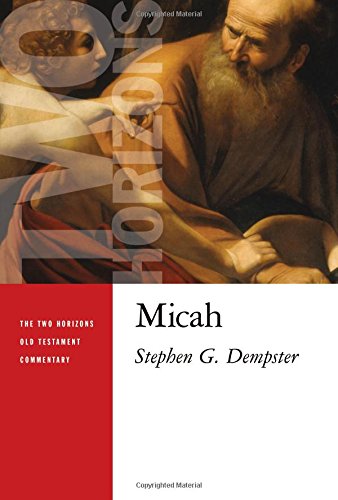A Brief Book Notice from Books At a Glance
By Fred Zaspel
Since reading his landmark Dominion and Dynasty Stephen Dempster has been one of my favorite Old Testament scholars, and so when I saw his new Micah commentary I knew I wanted a copy. And I was not disappointed. Dempster’s thorough exegetical reflection, insightful theological interpretation, and even contemporary application make this a “must have” commentary for anyone studying this “minor” prophet. A model commentary.
In keeping with the goals of the Two Horizons Old Testament Commentary series, Dempster is as concerned with theology as he is with exegesis, and on both scores he excels. These twin goals are pursued throughout the commentary, providing a rich resource for the preacher. Yet the concluding chapters at the end – “Theological Themes of Micah,” Micah’s Contribution to Biblical Theology,” and “Micah’s Relevance to Present-Day Theological Issues” – are by themselves worth the price of admission.
Without question this is my first “go-to” resource on the prophecy of Micah.
Endorsements
Daniel Block
This volume on Micah by Stephen Dempster represents biblical-commentary writing at its best. With brilliant insights, an engaging literary style, an impassioned tone, and a whole-Bible theological acumen, Dempster invites us into the world and message of this eighth-century prophet. But he does not leave us there. He challenges us to let its life-giving message transform our thinking about pressing social and ethical issues in our time.
Mark J. Boda
Founded in deep exegetical reflections and broad canonical connections, Dempster’s commentary draws out theological implications that will challenge contemporary audiences to embrace the message of Micah for faith and life.
Andrew Dearman
Dempster capably and insightfully interprets Micah as a book in its ancient setting, giving attention to historical, literary, and theological matters, while also placing its contents in a larger, biblical-theological context and showing its instructive power for contemporary reflection.
Craig A. Carter
Up to now, the theological interpretation of Scripture movement has clearly pointed out the failures of historical-critical commentaries but has struggled to provide a viable alternative. Here we see a truly theological commentary that uses a wide range of scholarship to engage the book of Micah as the Word of God. This is an outstanding example of what the commentary genre can and should be.
